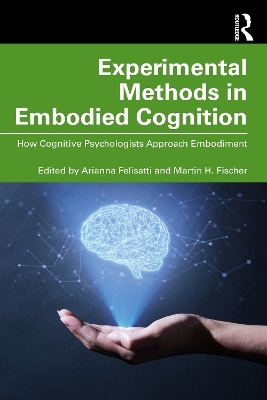
Experimental Methods in Embodied Cognition
Routledge (Verlag)
978-1-032-25613-9 (ISBN)
Embodied approaches to cognition are becoming increasingly prevalent in teaching and research globally, but until now a comprehensive book combining theoretical principles and practical methods for embodied cognition has been missing. Embracing this theoretical principle, the book introduces and compares different psychological methods from theoretical, technical, and methodological points of view. Informed by the direct experiences of a specialised group of authors, the text also offers a taxonomy of methods, including technical hands-on descriptions to support student learning. Each chapter includes suggestions for their use, enabling readers to compare methodologies and to find the most suitable approach for their specific research questions. Finally, the book also addresses the effects of different cultural immersions and learning experiences, offering an overview of other, non-psychological approaches to embodied cognition research, including comparative research with animals and humanoid robots.
This is an essential read for students and researchers of embodied cognition across various fields, ranging from psychology and cognitive neuroscience to philosophy, linguistics, economics, and sport science.
Arianna Felisatti is a cognitive scientist with a background in neuroscience and neuropsychological rehabilitation. Her main research interests are numerical cognition in humans and animals, mental arithmetic, finger counting, embodied cognition, and hemispheric asymmetry. Martin H. Fischer is a professor of cognitive sciences with a background in attention research and motor control. He is the leader of the Potsdam Embodied Cognition Group.
PART I Introduction; 1 The embodied cognition approach: Principles and research questions; 2 A taxonomy of methods in embodied cognition research; PART II Behavioral methods; 3 Chronometric methods: Reaction times and movement times; 4 Continuous methods: Eye tracking, hand tracking, and grip force recording, 5 Physiological methods: Heart rate, breathing, electrodermal activity; PART III Neuroscientific methods; 6 Correlational methods: EEG, fMRI, fNIRS and neurofeedback, 7 Non-invasive brain stimulation methods: Transcranial magnetic stimulation, transcranial electric stimulation, transcutaneous vagus nerve stimulation; 8 Neuropsychological methods: Patient studies; PART IV Other methods and interdisciplinary approaches; 9 Non-experimental psychological methods: Questionnaires, tests, and rating studies; 10 Virtual reality as experimental method in embodied cognition; 11 Interdisciplinary approaches to embodied cognition research
| Erscheinungsdatum | 13.10.2023 |
|---|---|
| Zusatzinfo | 3 Tables, black and white; 20 Line drawings, black and white; 3 Halftones, black and white; 23 Illustrations, black and white |
| Verlagsort | London |
| Sprache | englisch |
| Maße | 156 x 234 mm |
| Gewicht | 399 g |
| Themenwelt | Geisteswissenschaften ► Psychologie ► Allgemeine Psychologie |
| Geisteswissenschaften ► Psychologie ► Biopsychologie / Neurowissenschaften | |
| Geisteswissenschaften ► Psychologie ► Verhaltenstherapie | |
| ISBN-10 | 1-032-25613-3 / 1032256133 |
| ISBN-13 | 978-1-032-25613-9 / 9781032256139 |
| Zustand | Neuware |
| Informationen gemäß Produktsicherheitsverordnung (GPSR) | |
| Haben Sie eine Frage zum Produkt? |
aus dem Bereich


